Managers have decent salaries, waiters have tips. But the dish washers and cleaners on the graveyard shift to keep Mumbai’s hospitality industry chugging depend on service charge to educate their kids, insure their old
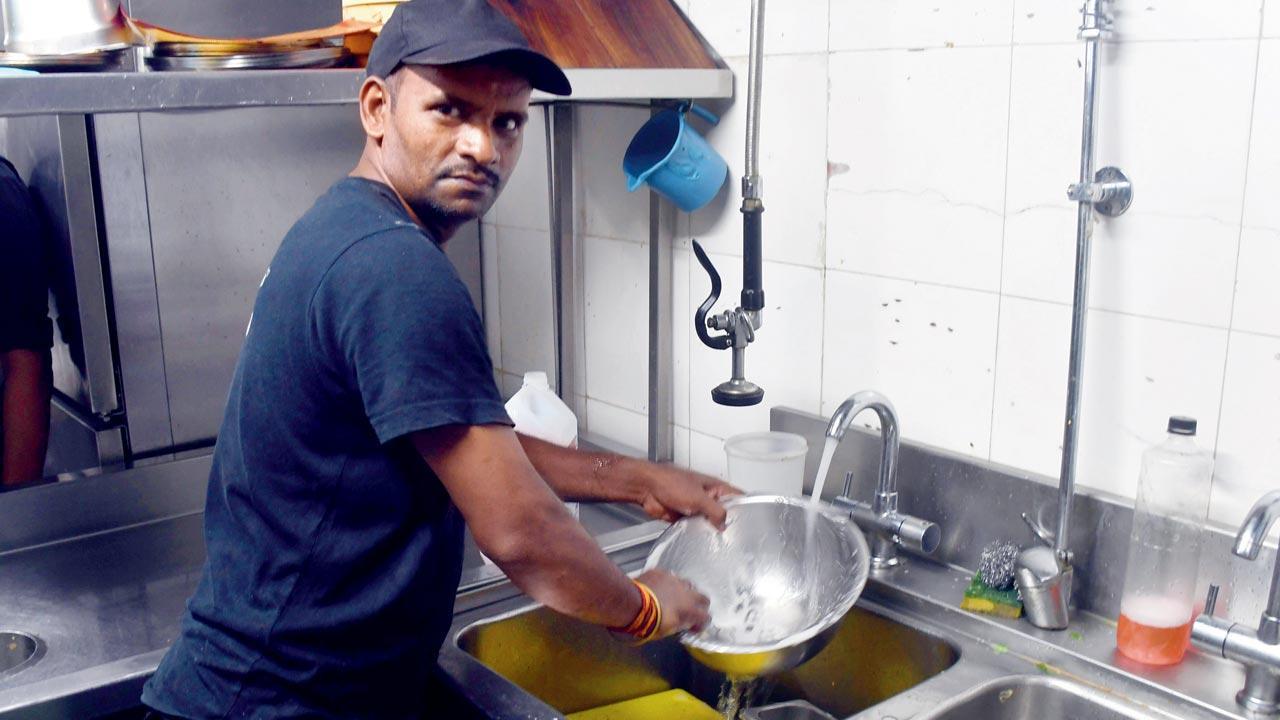
Uttar Pradesh native Bacchalal Bind, who works as moriwala in a Vietnamese eatery in BKC from 6 pm to 4 am, says he wouldn’t be able to afford a life in Kalwa with his wife if it weren’t for the extra income. Pic/Ashish Raje
When the most disciplined among us is waking up pre-dawn for a meditation session before the crows caw, Bacchalal Bind is still at work, tying up the previous night’s loose ends. Having done the dishes, cleaned the tabletops, mopped the floor of the kitchen and service area of Nho Saigon, a Vietnamese restaurant in Bandra Kurla Complex, where he has worked for six months, he readies to leave in time to catch the train to Kalwa, where he lives with his wife. He passes on the baton each morning to his colleague who does the next shift, also a “moriwala”. The term, which comes from the Marathi word for culvert or drain, is used across Mumbai’s hospitality establishments to denote a group of people who work backroom in restaurants and bars, cleaning up after the last customer has ambled out at 1 am. Bind, 37, who starts work every evening at 6 pm earns a salary of Rs 10,000. It’s not an amount that can get a couple by in unforgiving Mumbai. His eight-year-old son lives with his mother in Barki village, 37 km away from Varanasi, because education is cheaper there. Rs 4,000 from his salary sent across each month helps run his mother’s home.
ADVERTISEMENT
Bind says what makes the job worthy of keeping despite the graveyard shift and having to change multiple means of transport, is the additional Rs 3,500—goes up to Rs 6,000 in a good month—that comes his way when the restaurant’s service charge kitty is distributed.
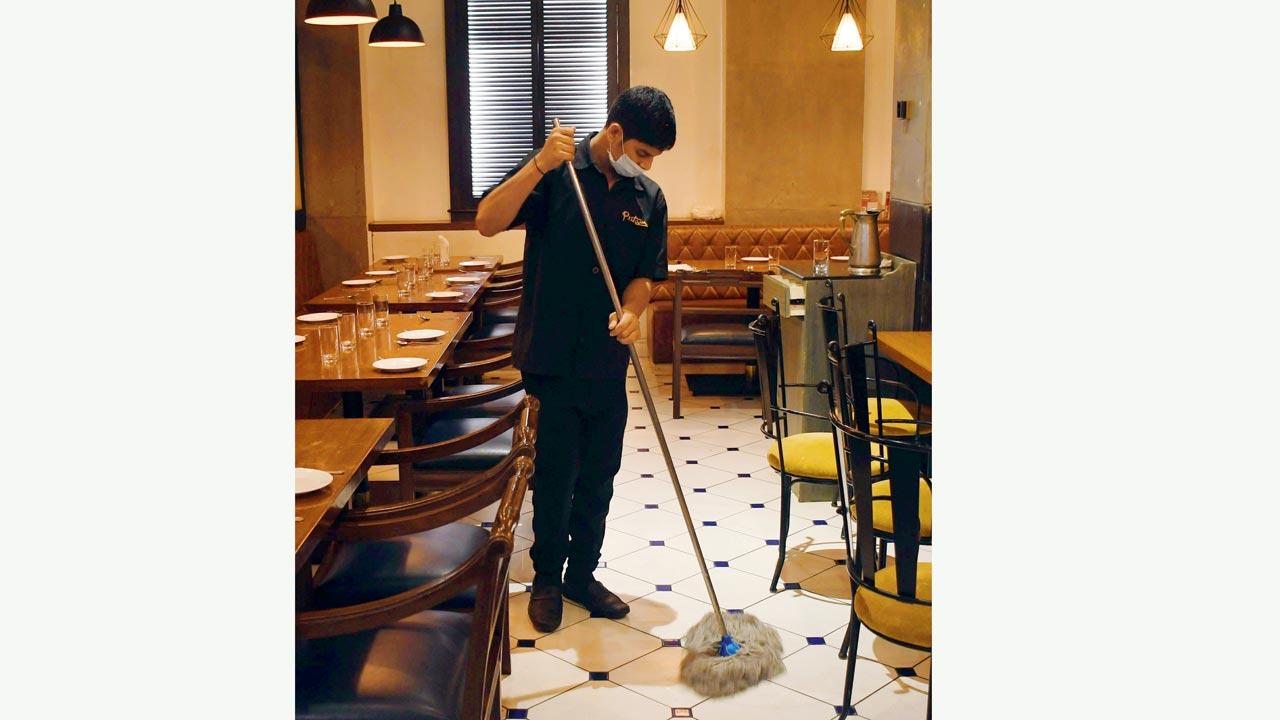 Rajnish Singh, housekeeper of Pritam Daba resturant ,Dadar. Pic/Ashish Raje
Rajnish Singh, housekeeper of Pritam Daba resturant ,Dadar. Pic/Ashish Raje
Bind says he has been thinking about the ongoing debate that’s caught the country’s hospitality industry in a knot. Is it legal to include service charge in a customer’s bill?
Over the last few weeks, the government and restaurant associations have been at loggerheads over whether a tip can be mandatorily added to a restaurant or hotel’s bill. The National Restaurant Association of India (NRAI) has argued that all menus mention the levy of service charge. The body claims to represent over five lakh restaurants in an industry valued at R4,23,865 crore. Once a customer places an order, it is understood that s/he automatically enters into a consensual contract that implies that he has agreed with the terms and conditions of the said eatery. On June 2, the Department of Consumer Affairs (DoCA) led by Secretary Rohit Kumar Singh, held a meeting with the restaurant associations and consumer organisations to discuss the levy of the 10 per cent service charge on bills. While those representing the consumers argued that the levy is arbitrary and a restrictive trade practice under the Consumer Protection Act, Singh added that consumers are misled on the legality of such charges and sometimes harassed by restaurants on making a request to remove such charges from the bill amount. DoCA is expected to come up with a framework to ensure strict compliance by the stakeholders. NRAI issued a statement post that clarified that until further notice, service charge levy is legal.
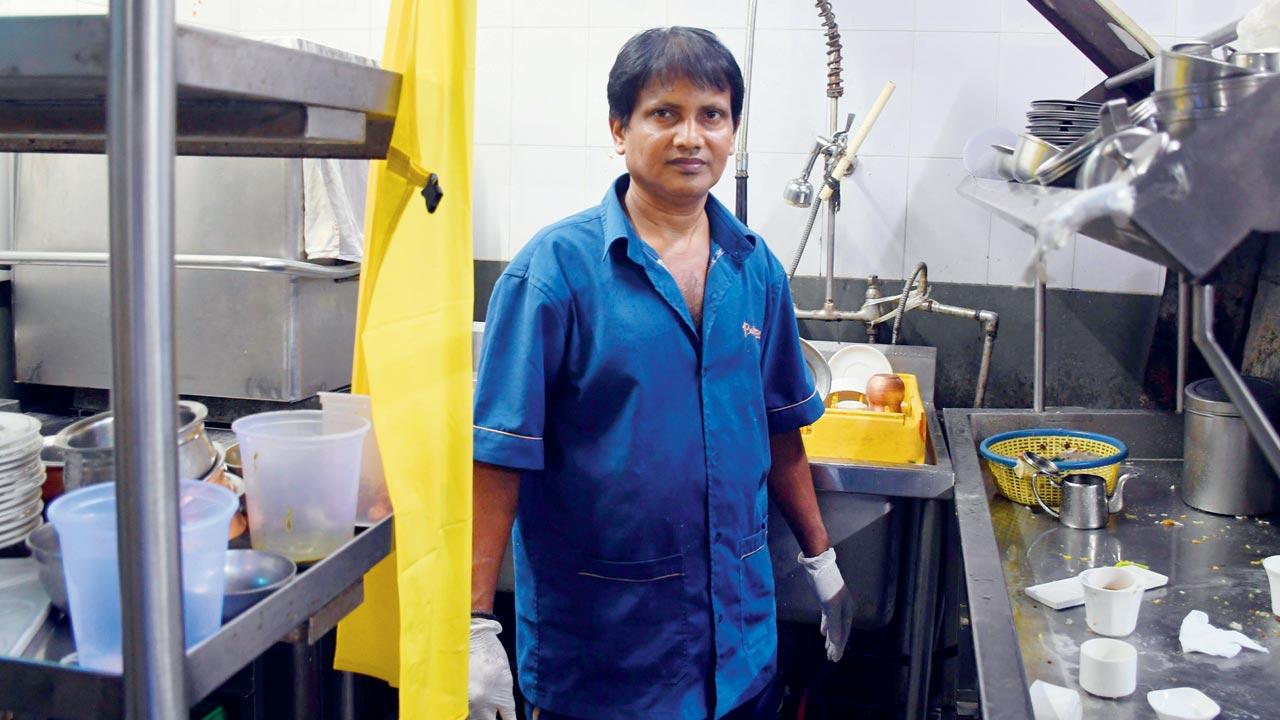 Arun Nath, originally from Kolkata, works 14 hours a day, and sleeps in the Dadar restaurant where he works as moriwala to save on rent. He is able to send his entire salary to his family because service charge takes care of his day-to-day expenses, and the EMI of an insurance policy
Arun Nath, originally from Kolkata, works 14 hours a day, and sleeps in the Dadar restaurant where he works as moriwala to save on rent. He is able to send his entire salary to his family because service charge takes care of his day-to-day expenses, and the EMI of an insurance policy
Bind says that if the decision were to go against restaurants, he would have to cut corners in his monthly budget. “I will have to cut down on one meal in a day. The electricity bill comes to anywhere between Rs 900-Rs 1,100. It has to be paid, so does the water bill. And the monthly ration...” his voice trails off.
In April 2020, days after a nationwide lockdown was announced due to the spread of the Coronavirus infection, Bind was fired from one of the city’s top restaurants. Scared sick, and with nowhere to go, he spent the first eight months locked up at home, living off the provident fund that he had managed to save from his previous job. When things eased up, he travelled home and returned three months later ,when his funds ran out. “I have been in Mumbai for 18 years, and always worked as a moriwala. I don’t know what else I can do. Two months before joining this restaurant, I did manage to get one job outside the industry. It was to transport oxygen cylinders. It was risky and the cylinders were heavy. They said I would get no compensation if I was hurt on the job.” With the salary and service charge income he now makes, he is able to save R1,500 every month. “It’s what will get us by through the monsoon, when business is slow and customers, few.” Bind says he hopes that the government thinks about staff like him, who are yet to fully recover from the hit of the pandemic.
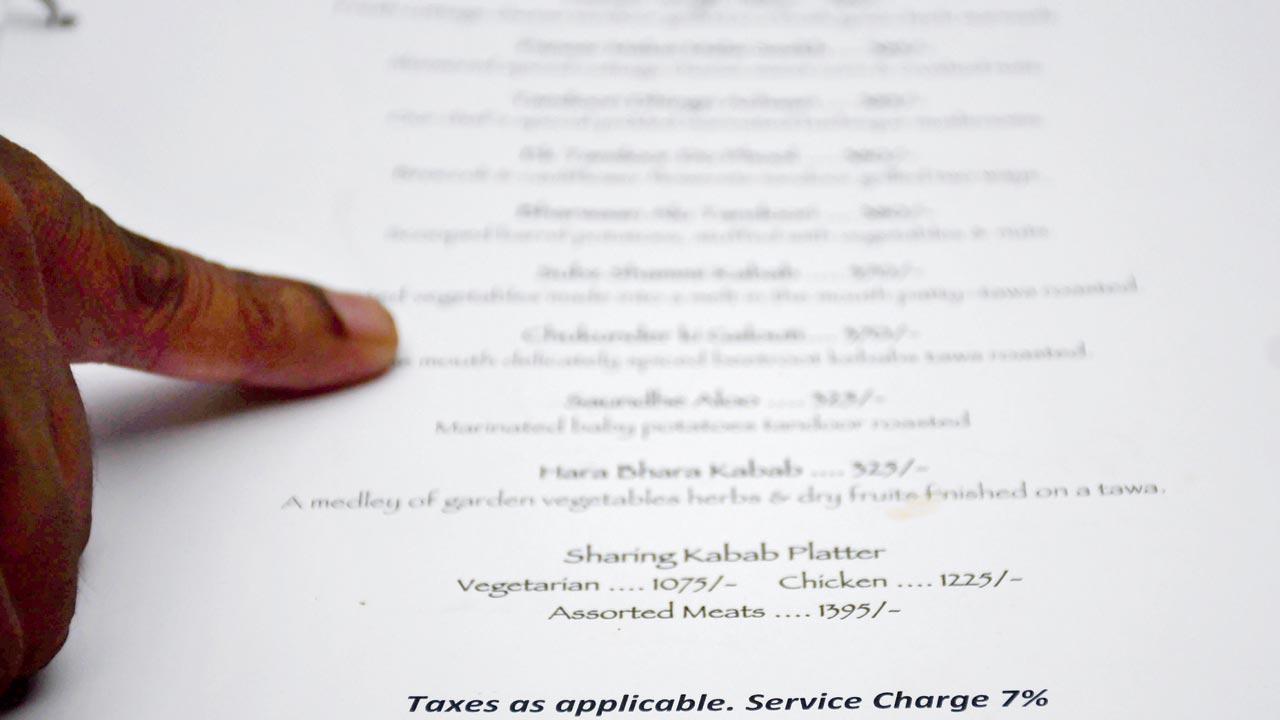 Representatives of restaurant associations argue that all menus clearly mention the percentage of service charge levied, thereby offering transparency to the customer
Representatives of restaurant associations argue that all menus clearly mention the percentage of service charge levied, thereby offering transparency to the customer
To save on house rent, Arun Nath, a moriwala who has worked at one of Dadar’s oldest and most popular restaurants since 1999, lives at the eatery’s staff room. His home is in Kolkata, which is where he sends his whole salary amounting to Rs 10,000. The additional Rs 4,000 from the seven per cent service charge that his employer levies on the bill, help pay his day-to-day expenses. His mother, wife, 14-year-old daughter and 13-year-old son, whom he sees once a year on his annual break, survive on this income. “The service charge comes handy for my day-to-day expenses as well as to pay the monthly installment of an LIC policy,” says Nath, whose job starts at 10 am and continues till midnight, with a four-hour window of rest.
The story repeats itself at practically every restaurant in the city. In the absence of social security, employees say they are on their own if something untoward were to happen. Most end up using money earned from service charge to secure their families. Ashok Makwana, 42, a captain at a family-owned restaurant in Dadar splits the R6,000 he makes monthly from service charge into a SIP fund installment for his wife, and another Rs 3,000 in the government’s Sukanya Samriddhi Account Scheme. It’s for his daughter who will gather a princely sum of Rs 15 lakh when she turns 18. Makwana, whose job it is to ensure the satisfaction of customers, says the eatery sets aside 15 per cent of the service charge kitty towards breakage and divides the remaining among employees. While 60 per cent of this goes to the serving staff, 40 per cent is for those employed in the kitchen and utility.
 Gurbaxish Singh Kohli, VP, FHRAI
Gurbaxish Singh Kohli, VP, FHRAI
“It’s how I dare to send my children to study at a private school. Their annual fees come to a lakh. If I didn’t have this income, I would have to move them to a government school,” says Makwana’s colleague Kirti Raj Singh, 51.
Nho Saigon’s bar supervisor Nikhil Kambli is just 22, but shoulders the responsibility of his family of four. It means the onus to run the home and repay family loans is on him. Kambli admits that in a good month, the service charge kitty exceeds the salary. His salary is Rs 17,000 and he makes another Rs 15,000 from service charge because he is ranked point 5; the highest in the point system followed at his workplace. “It will be a disaster for me [if service charge is stopped by the government]; I have to set aside Rs 13,000 every month towards loans we have taken,” says Kambli, who recently lost his mother, a clerk, who was an equal contributor to the family’s finances. “I won’t quit the industry because this is my passion,” he says about bartending, “but then we’d expect to be paid better. If the industry contributes heavily to India’s GDP, our voices should be heard.”
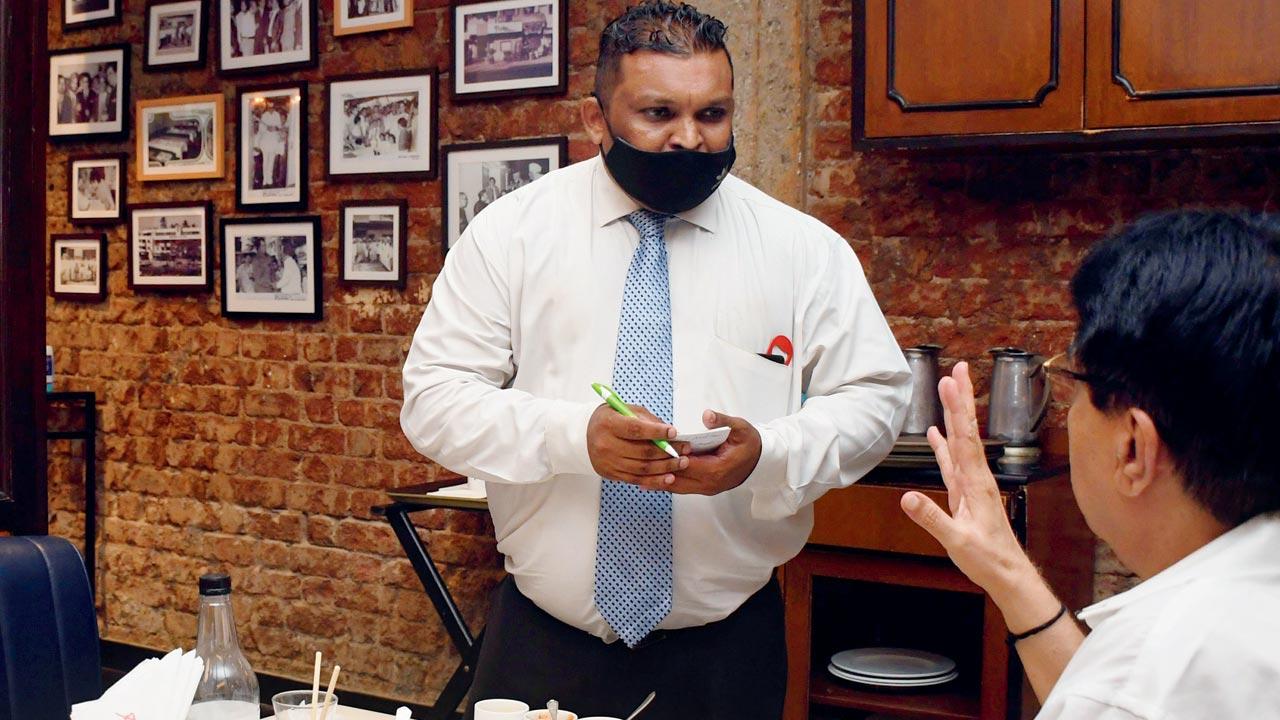 Ashok Makwana is a captain at a family-owned restaurant in Dadar. The eatery sets aside 85 per cent of service charge for distribution among serving staff and those working in the kitchen and utility
Ashok Makwana is a captain at a family-owned restaurant in Dadar. The eatery sets aside 85 per cent of service charge for distribution among serving staff and those working in the kitchen and utility
Service charge has long been a thorny subject. A 1962 judgment by the Supreme Court could perhaps be one of the early documents referencing the said charge when a group of employees took their employer to court, demanding for a share in the service charge collected. “It, however, proceeded to issue a direction to the management of the Claridge’s Hotel that from April 1, 1962, it should distribute 85 per cent of the service charge collected among the workmen rateably according to and on the basis of the basic wage drawn by’ each one of them during the relevant year,” reads a part of the judgment.
“Service charge has been a norm globally. It has existed in India before the 1960s,” says Pranav M Rungta, managing committee member & Mumbai chapter head, NRAI, adding that only a small percentage of restaurants in India levy service charge, which usually ranges anywhere between five to 10 per cent, depending on individual restaurant policies. “Competitive business pressures allow for a business to charge as per their discretion. There is no law capping service charge,” he clarifies.
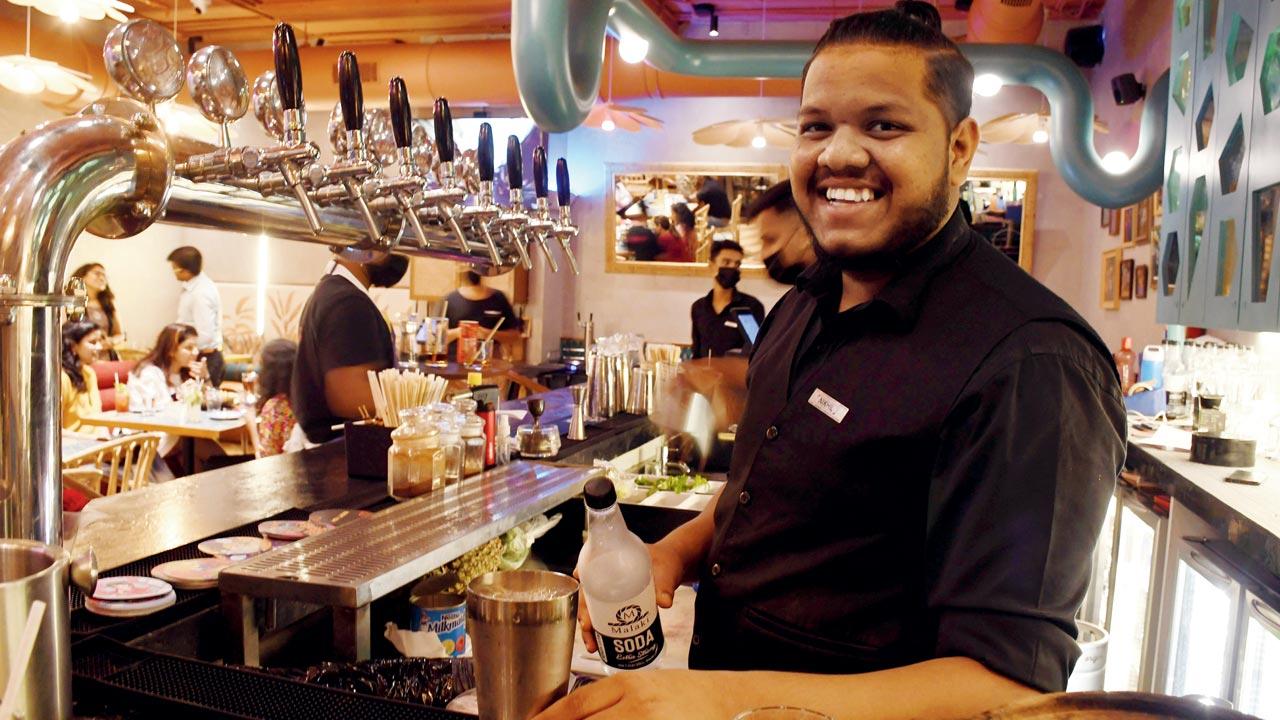 Nikhil Kambli, 22, a bar supervisor earns close to R15,000 every month in service charge because he is ranked at 5—the highest in the point system followed at his workplace
Nikhil Kambli, 22, a bar supervisor earns close to R15,000 every month in service charge because he is ranked at 5—the highest in the point system followed at his workplace
Critics point to this adhoc levy, which unlike taxes that the government makes mandatory, are decided by individual restaurant owners. The process of distribution of service charge also varies from restaurant to restaurant. “There are two prevalent systems: equal distribution to all employees, and a point system distribution where staff get points based on their seniority and experience at the said restaurant,” he explains. When mid-day asked Rungta why restaurants don’t consider placing a cap on maximum service charge along with transparency on distribution mechanism, Rungta advises against it. “We needn’t tell each restaurant how to do their business. Tomorrow, someone will want us to decide how much a dish should cost. It is a matter of demand and supply; if they can take a call on the price of their dishes, they can also decide on the percentage of service charge. When it comes to distribution, it is usually a call taken by the staff whether they wish for equal distribution or want to follow the point system.” Rungta argues that service charge, in fact, encourages transparency. “At present, the customer is aware that s/he is paying a component towards service and need not therefore, pay a tip. If the government does come up with a legal framework, then the same amount will be factored into the menu price. An unknowing customer would therefore, end up paying a rate for the dish and tip over and above.”
Seconding Rungta, Gurbaxish Singh Kohli, vice president of the Federation of Hotel & Restaurant Associations of India (FHRAI), says every service demands a charge. “There is a charge that you are asked to pay at every portal, including government portals like IRCTC and Income Tax. At times, this charge is called other names, like convenience fee, surcharge or cess. Our industry offers clarity on what this charge is, tells you how much we are levying and you know where it is going. When it comes to other industries, we don’t even know where this additional amount taken is going, but we are paying it every time we book a ticket to travel or watch a film. I don’t know why our industry is being targeted.”
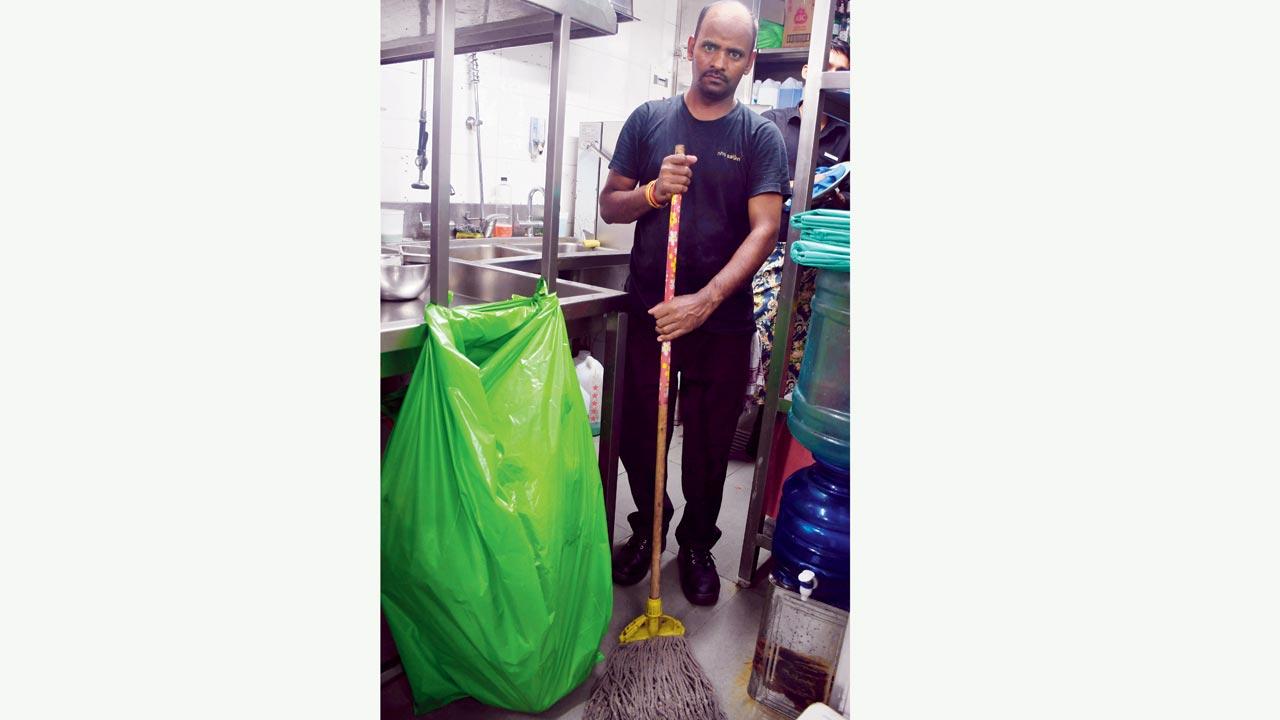 Bacchalal Bind works as moriwala at BKC’s Vietnamese restaurant Nho Saigon. He is able to afford to live in Kalwa near Thane with his wife, and sends money home to his son and mother in Barki village of Uttar Pradesh because of the extra income he makes from service charge. Pics/Ashish Raje
Bacchalal Bind works as moriwala at BKC’s Vietnamese restaurant Nho Saigon. He is able to afford to live in Kalwa near Thane with his wife, and sends money home to his son and mother in Barki village of Uttar Pradesh because of the extra income he makes from service charge. Pics/Ashish Raje
There is of course, a whole world of eateries that characterise Mumbai’s budget hospitality industry, that doesn’t know service charge and runs on tip. Among these is Mulund’s popular Deepak Bar & Kitchen, serving customers for over 60 years. “We cater to a price-sensitive market and have to compensate the staff with a better salary plus benefits like medical expenses. About 80 per cent of my staff has been with me for over 10 years. The tip, which is anywhere between two to 10 per cent of the bill, goes directly to the person who is serving a table. But we also have an incentive system in place where the employees are incentivised on the basis of monthly food cost, which is selling price minus cost of raw material. Over the years, I have figured what it should be so that whenever our profit increases in this area, all our employees are incentivised. This also keeps the wastage in check,” says its owner Pragnesh Rai.
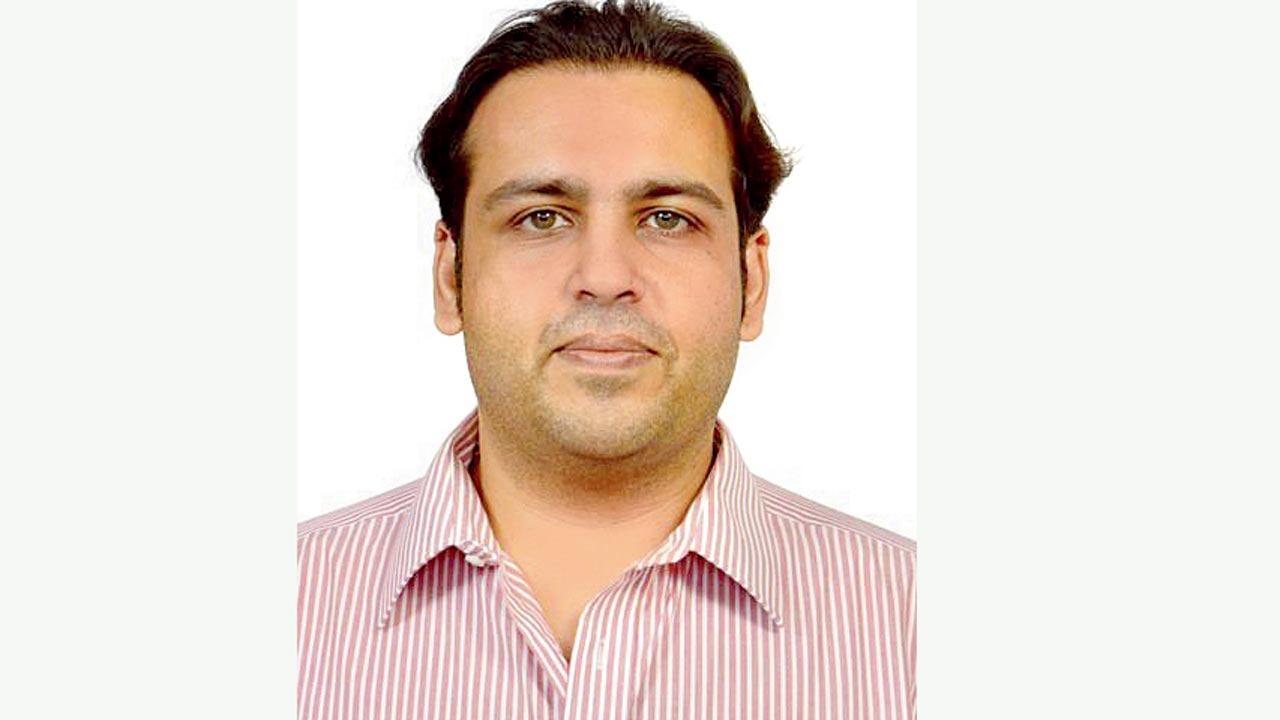 Pranav M Rungta
Pranav M Rungta
Fresh Catch, one of Mahim’s oldest seafood joints, now with a brand new branch in Bandra, collects all tips in a box. The owners add an additional amount from their end and the lot is divided among the staff. “Our prices are on the higher side compared to other seafood restaurants, because I invest more in buying the freshest produce. So, I don’t wish to levy a service charge on the customer bill. From the tip box, those at the lowest salary get the biggest chunk,” says co-proprietor Ankita Fernandes.
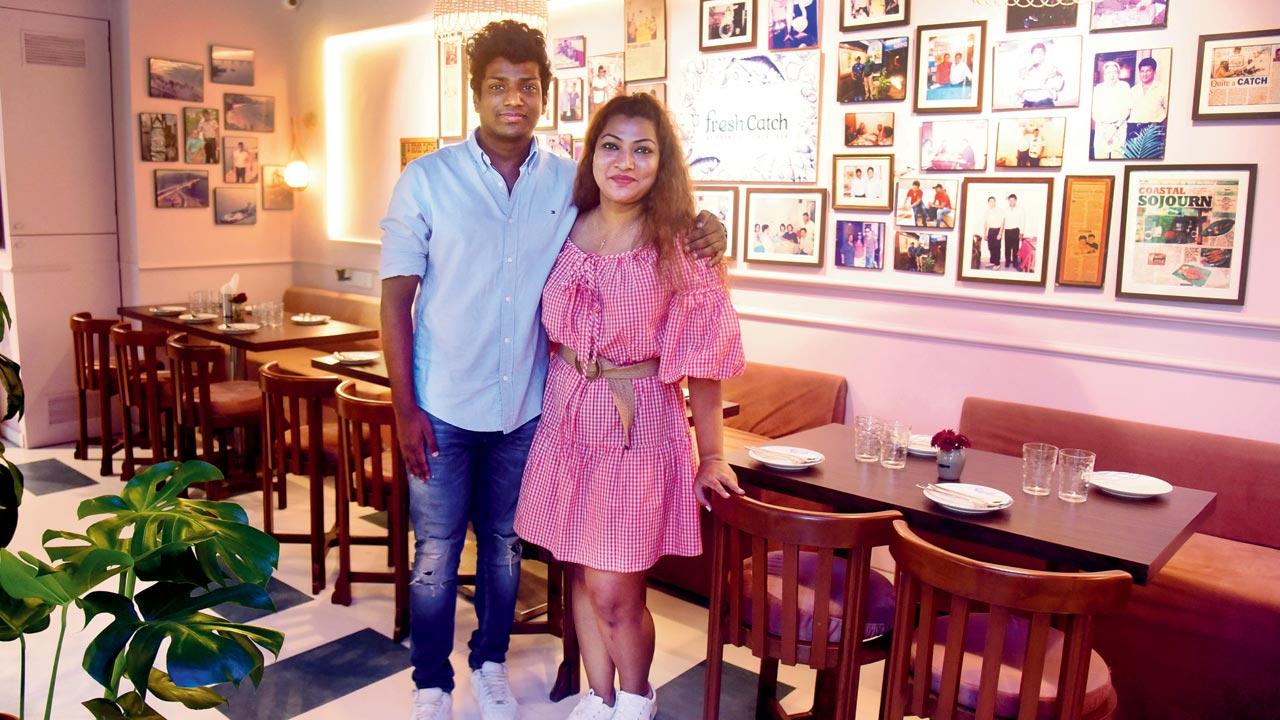 Fresh Catch, which launched a Bandra branch after running a hugely popular Mahim outpost for decades, follows the tip system “because the dish prices are already on the higher side due to the high quality catch we source,” says co-proprietor Ankita Fernandes (seen here with brother Adith). Pic/Shadab Khan
Fresh Catch, which launched a Bandra branch after running a hugely popular Mahim outpost for decades, follows the tip system “because the dish prices are already on the higher side due to the high quality catch we source,” says co-proprietor Ankita Fernandes (seen here with brother Adith). Pic/Shadab Khan
What is a service charge?
It is a fee charged by restaurants over and above the price of food and drink for the additional convenience of serving while dining in. Service charge is not and cannot be charged for take-outs or home deliveries.
 Subscribe today by clicking the link and stay updated with the latest news!" Click here!
Subscribe today by clicking the link and stay updated with the latest news!" Click here!







